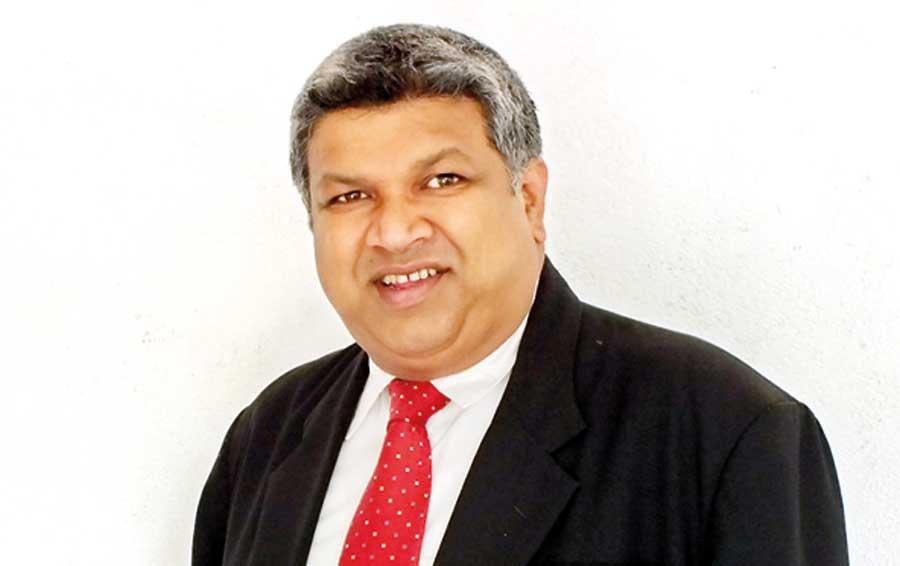15 Jul 2020 - {{hitsCtrl.values.hits}}

Thieves are inside Parliament hiding behind privileges
We must push for democracy, not dictatorship
 Harshana Nanayakkara is an outspoken lawyer and campaigner for democracy representing the National People’s Power (NPP) for the Colombo District at the upcoming parliamentary elections. The NPP, affiliated to the Janatha Vimukthi Peramuna (JVP), is promising a policy-based programme to address the current needs of the people. Nanayakkara spoke to the Daily Mirror on the NPP perspective and other social, economic and political issues. Excerpts:
Harshana Nanayakkara is an outspoken lawyer and campaigner for democracy representing the National People’s Power (NPP) for the Colombo District at the upcoming parliamentary elections. The NPP, affiliated to the Janatha Vimukthi Peramuna (JVP), is promising a policy-based programme to address the current needs of the people. Nanayakkara spoke to the Daily Mirror on the NPP perspective and other social, economic and political issues. Excerpts:
Q You have referred to a social contract between the voter and representative. If elected to Parliament, how would you uphold your side of the social contract?
The role of Parliament is to prepare laws and policies and keep an account of public money. Members of Parliament (MPs) must know about policy and law making, and also have integrity because they are accountable for public money. I will uphold my side of the contract by supporting policy making and ensuring public funds are well spent.
Q The NPP sought 10% of the vote at the 2019 Presidential election, but won just 3%. How will you increase this figure this time round?
We expected people to change their thinking, and thereby attract more votes. The NPP is the only party to present a 122-page scientifically researched policy document outlining our plans. But the fear psychosis, racism and religious bigotry created around the Easter Sunday attacks and issues like abortion doctors and sterilization pills were used by the Rajapaksa camp to increase their vote base. In turn, the Premadasa camp was fear mongering about white vans and so on. People made choices based on fear, not policy. So our policy-based programme was drowned out.
Q How would this change in the Parliamentary polls?
People will definitely choose us for Parliament because the six MPs of our member organisation, the JVP have performed very well in Parliament. Even our most hardened critics say they should be there. So I’m certain we will have many MPs in Parliament this time.
Q Are there moves to form an alliance between the JVP and Frontline Socialist Party (FSP)?
If the FSP wants an alliance, they must form it with the NPP, of which the JVP is a partner. Our forum is open to any organisation if they are uncorrupt and progressive. The FSP has these qualifications. But whether discussions are happening now, I do not know.
Q What qualities must a progressive party possess?
A progressive party must talk to people, be open to criticism and correct themselves. Progressive means you must be left-leaning and accept people regardless of ethnicity, gender or sexual orientation. Everyone must be treated as human. The NPP and JVP have shown a willingness to change according to the current needs of the people. 
Q What have you identified as these needs?
They are social, economic and political needs. Economy comes first, as there are some five million people earning below US$ 2 a day. There must be a reasonable distribution of wealth. COVID-19 opened people’s eyes to the importance of food security and a strong public health sector. In our education system, only 3% who join Grade 1 in school, enter university. We must address this massive dropout rate. First, we must find corrupt-free, intelligent, humane, knowledgeable and experienced people. Above all they must have a clear conscience. Such people should be in Parliament.
Q The Sri Lanka Podujana Peramuna (SLPP) is seeking a two-thirds majority to change the Constitution. What’s your response?
In theory, the Constitution is the will of the people. So it should be changed according to the will of the people. A consultation process must also be followed. But if the government wants the NPP vote, they should explain why they want to amend the Constitution.
Q One reason is to abolish the 19th Amendment.
We won’t vote for that. Would Mahinda Deshapriya be this vociferous, if not for the independent Election Commission created by 19th Amendment? We need a process of checks and balances. Our biggest problem is unrestricted presidential powers. The 19th Amendment brought back some democracy from a dictatorship. Now the government wants it abolished.
Q What is the NPP stance on the Executive Presidency?
We want the President appointed by Parliament, and to stop all crossovers. And presidential pardons will be subject to Cabinet scrutiny. We want the Executive Presidency abolished. Even Mahinda Rajapaksa, Chandrika Bandaranaike Kumaratunga and Maithripala Sirisena said this. Everyone says it, but nobody does it. We must push our country towards democracy, not dictatorship.
 Q President Gotabaya Rajapaksa recently established a Task Force to build a disciplined, virtuous and lawful society. Your response?
Q President Gotabaya Rajapaksa recently established a Task Force to build a disciplined, virtuous and lawful society. Your response?
I don’t know how constitutional this is, because he is supposed to run with a Cabinet of Ministers. I hope these Task Forces would end after the elections, and they would return to ministers accountable to Parliament. Otherwise we would have Task Forces not accountable to Parliament and only accountable to the President. If a Task Force does something wrong, we must have a remedy to take it to Parliament. Democracy is on the line here. Also, how can you create discipline through a Task Force? Building prisons and apprehending people means this is not a disciplined society. There must be a social approach.
Q How then should lawlessness and indiscipline in society be addressed?
By first cleaning up the Parliament. Illegal sand excavators, the drug mafia and other undesirable elements are in Parliament. In the past, thieves used to hide in jungles. Now thieves hide inside the Parliament behind privileges. So you can’t catch them. Crime and lawlessness appear due to political intervention. To build discipline, fix the Parliament first. What we tell people is that thieves are hiding inside Parliament.
Q But this is what people were told in 2015 as well, during the Yahapalana campaign.
Ranil Wickremesinghe and Maithripala Sirisena betrayed it. The JVP picked up the anti-corruption campaign, which appealed to the people. But Yahapalana, which had a bigger voter base, took over. We had hope and an innocent dream that this country would be better. But they betrayed it so badly.
Q A political analyst recently suggested the NPP may not be a viable alternative to the SLPP, but it could be an effective opposition. Do you agree ?
The NPP is the only proper opposition. President Gotabaya Rajapaksa will not get two-thirds from the election. But he’ll get it from some United National Party (UNP) and Samagi Jana Balawegaya (SJB) members who would cross over for money. If you are an anti-Rajapaksa voter, the NPP is the only safe place, because we won’t cross over and sell out.
A strong opposition cannot be bought over. So it’s true we are a good opposition. But I disagree that we are not the alternative. We are the only alternative. But people don’t hear us right now. But the day we are about to win, when our 3% goes over 15%, people will start hearing us. So in the short-term we are the best and the only opposition, and in the long-term, we are the only alternative.
Q In the past, the JVP could mobilise people. But lately we haven’t seen much mass mobilisation by the NPP. Why is this?
Those days the JVP would mobilise people on the streets. But now we mobilise them on social media platforms. We are still the only group that can call a press conference within eight hours of an issue. If tomorrow the MCC is to be signed, we will take to the streets.
We mobilised our trade unions on the Eastern Terminal issue. We mobilised people island-wide against the slashing of the promised pension increase. As a political party, we must sometimes pick our battles. We have faith in Parliament, and we want the will of the people to be represented there. But we have never allowed important public interest issues to be swept under the carpet. So when the need arises, we will be the first to be on the streets anywhere.
19 Apr 2024 1 hours ago
19 Apr 2024 2 hours ago
19 Apr 2024 3 hours ago
19 Apr 2024 3 hours ago
19 Apr 2024 4 hours ago